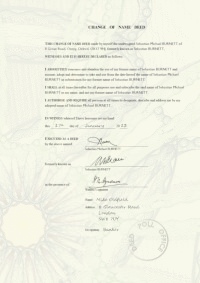What is a deed poll?
A deed poll is a kind of legal document used to prove a change of name.
In the U.K., changing your name is a legal matter. That means that there's no “official” place where you go to register your new name. In law, your name is legally established by usage. In theory you can just start using a new name, and gradually become known by it.
But to update your passport, driving licence, and most other official documents, you’ll need a formal document which proves that you’ve changed your name, and when you changed it.
A deed poll (or change of name deed) is a kind of formal legal document whereby you promise to give up your old name and use a new name for all purposes. It’s accepted by all government bodies in the U.K., including HM Passport Office and the DVLA. It’s also accepted by all banks and other organisations in the U.K.
You’ll have to sign and date your deed poll, and it also needs to be witnessed. When you make an application with us, we’ll send you full instructions on how to complete the document, and what to do with it afterwards.
What’s the meaning of “deed poll”?
A “deed” is a (written) legal document in which you promise to do something, like buying a house or changing your name.
A deed must be “delivered”, which means that you must do some action that you’ve promised to do in the deed. (The action can be something symbolic like handing the document to another person.)
A “deed poll” means a deed which is only signed by one person. (A deed between two people, on the other hand, is a “contract”.)
But most people mean and understand a “deed poll” to be a deed in which you promise to change your name — because this is the most common use of a deed poll.
Why is it called a “deed poll”?
It’s called a “deed poll” because a deed poll would once have been written on a long roll of paper, and then — once written — the deed was cut off (“polled”) from the roll using a straight cut. (Using a long roll of paper was sensible — it stopped someone tampering with the document by adding extra pieces of paper.)
When the deed was a contract between two (or more) people, though, it would have been written out twice and then cut off with a zig-zag or wavy cut. This was called an “indenture” (from the Latin word “dens”, meaning “tooth”). (This was another security feature — it meant that the two parties could verify that the other party’s deed was genuine, by holding them up against each other.)
But a deed poll — being signed by one person only, and written out once — was cut (“polled”) with a straight line.
What about a “change of name deed”?
“Deed poll”, “change of name deed”, and “deed of change of name” are different terms for the same thing.
There is no difference between the terms, and they’re interchangeable.
What’s the plural of “deed poll”?
Technically, you should say “deeds poll” to say more than one. However most people (including us) say “deed polls”. Both are correct.
Do deed polls exist in Scots law?
Scots law does have “deeds”, and it means the same thing as in English law. However — unlike in English law — there isn’t a technical definition of what makes a deed a deed.
In Scots law, a “deed poll” would be legally valid as a unilateral obligation. However most Scottish people use the term “deed poll”.

Do I need a deed poll?
If you’ve recently got married or divorced, or entered a civil partnership, you may be able to use a document that you already have, instead of a deed poll.

